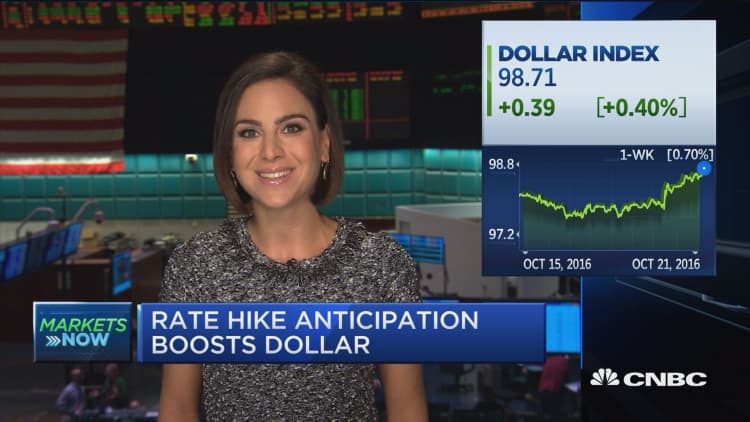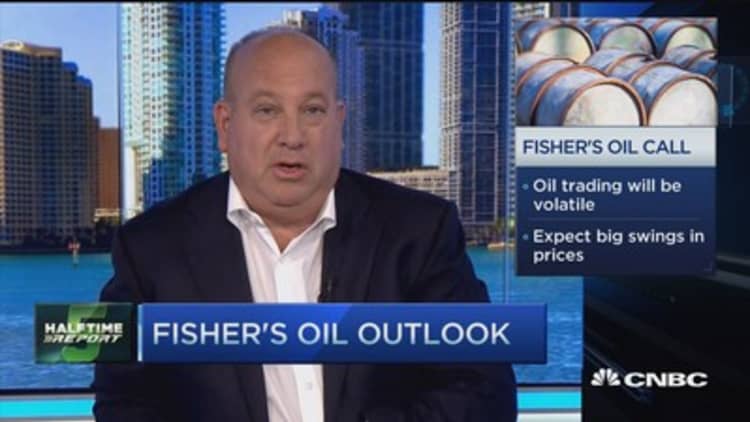Oil prices settled slightly higher on Friday to put up a fifth straight weekly gain for U.S. crude, as bullish comments from Russia contended with a resurgent dollar and a rising oil rig count.
U.S. West Texas Intermediate (WTI) crude settled up 22 cents higher at $50.85 a barrel, closing the week up 1 percent.
Global benchmark Brent crude futures rose 42 cents to $51.80 a barrel by 2:41 p.m. ET (1841 GMT). The contract is down about 0.3 percent for the week.
A closely watched report from oil services firm Baker Hughes showed the number of active U.S. oil rigs rose by 11 this week, the 17th week without a decline in the rig count.
The last time U.S. oil rigs rose by 10 or more was two months ago, when there were 15 additions in the week of Aug. 15 and 10 in the week of Aug. 19. U.S. crude prices then ranged between $44 and $48.

"This is what we've been anticipating. With prices at these levels and rising, rig count increases will likely be in the double digits hereon," said Tariq Zahir, crude trader at Tyche Capital Advisors in New York.
Some traders and analysts have warned for weeks that U.S. shale oil drillers, responsible for much of the worldwide crude glut of the past two years, were likely to ramp up activity with WTI back at above $50 from 12-year lows of around $26 in February.
A rallying dollar limited oil's advance as greenback-denominated commodities, including oil, less affordable to holders of other currencies. The dollar surged to a seven-month high against a basket of currencies, its third straight week of gains.
Oil prices are up about 13 percent since the Organization of the Petroleum Exporting Countries announced on Sept. 27 its first planned output cut in 8 years to rein in a global glut that halved prices from mid-2014 highs above $100 a barrel.
Prices got support on Friday from Russian comments reiterating its commitment to joining a producers' output freeze. Russian Energy Minister Alexander Novak said he would make proposals to his counterpart from OPEC leader Saudi Arabia this weekend on price-supportive measures.
But Novak also said Russia will produce 548 million tons (11 million barrels per day) of oil next year, a post-Soviet record.
"A freeze at all-time record level is not necessarily the tonic necessary to support prices," said David Thompson, executive vice-president at Powerhouse, an energy-specialized commodities broker in Washington.

OPEC will hold a meeting on Nov. 30 to find common ground on capping oil production. The cartel is expected to work out how each member country will contribute to a freeze at the gathering.
"Supply cut discussions have stabilized the prices above $50 a barrel. What we see now is somewhat consolidating in a wait-and-see mood," said Frank Klumpp, oil analyst at Stuttgart-based Landesbank Baden-Wuerttemberg.
Oil-producing countries are hoping for higher crude prices to boost their economies. Nigeria's finance minister said on Friday he hoped oil prices would stabilize in a range of $42-50 a barrel.
"The near term fundamentals in the oil market have turned positive. Demand is stabilizing, OPEC production has peaked (and will fall if cuts are implemented), and global inventory declines imply that the market is more balanced than many believe," Neil Beveridge of Bernstein Energy said in a note to clients.
But Olivier Jakob, oil analyst at Petromatrix said: "We have been cautious in the current (oil) flat price rally, based on our forecast of an OPEC supply surge in the fourth quarter and a widening of the Brent contango."

